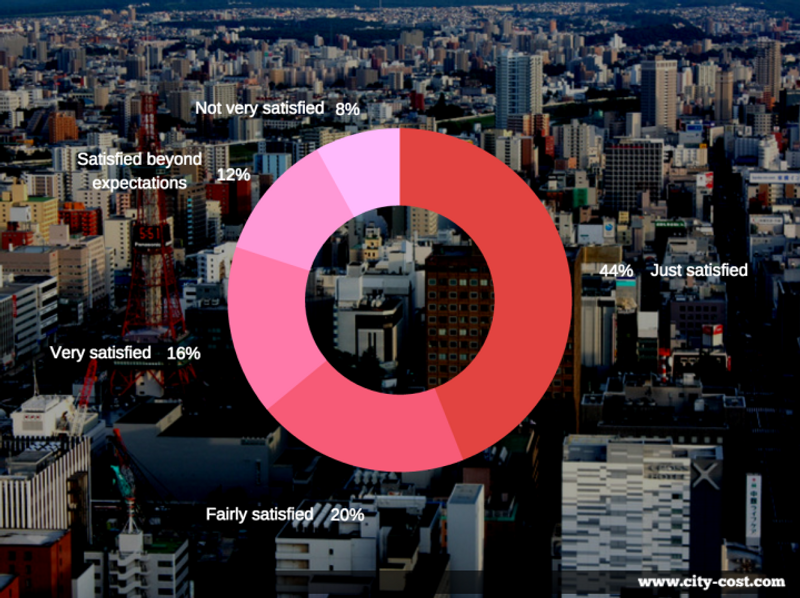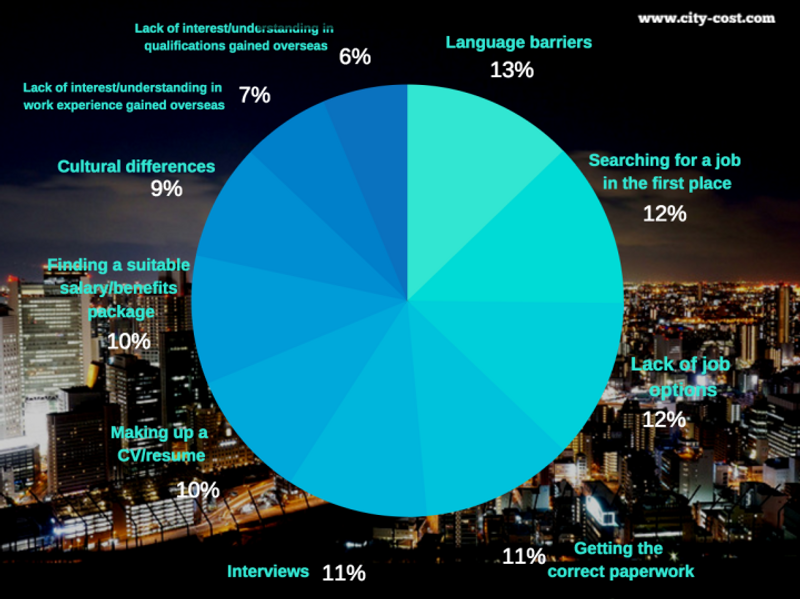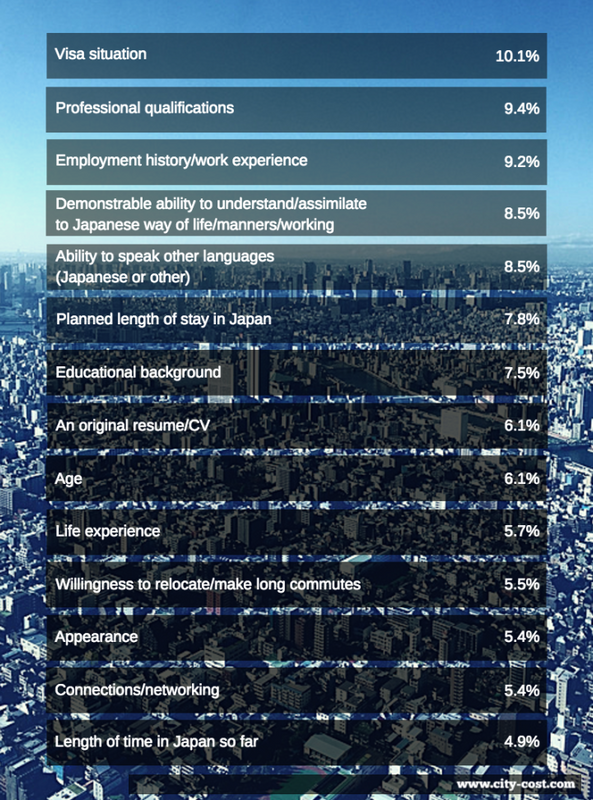Finding a job could rarely be considered easy. How do the searches and appeals to employers pan out for expats in Japan? We take a look at some the key factors and difficulties of finding a job on these shores. But first up, are we satisfied with the end result? We asked you ...

(Summary of responses to the question: How would you rate your ‘job satisfaction’ in Japan?)
This expat found their first job in Japan in the ‘job section’ of a high-brow broadsheet news rag back home. It was an English teaching gig but with an outfit whose name sounded like a seat of higher learning that might be headed by Noam Chomsky (although it was teaching kids). Interviews took place in my home nation’s capital, in the conference rooms (and later bar - they pricked up the tab) of a posh hotel. They were conducted in pairs (in a sense, candidates interviewed each other). In those days I was just getting to grips with my first cell phone. The cursed thing went off three times during the interview (the first noise emitted upon taking my seat), due to messages received from well wishers. Amazingly they still gave me the job (although one more ring and I was out, I later learned).
Reflecting their name I guess, the school ran a tight ship. They made the paperwork as smooth as possible (Cert. of Eligibility, visa, et al), got me settled into a nice apartment, and eased me into the machinations of working life in Japan. This finding a job lark is plain sailing, I thought at the time.
After a bit of a world tour with a backpack I had a second go at finding a job in Japan. This time via frantic Internet searches in beachside ‘net’ cafes with developing-world Internet connections. My interview took place over the phone in an Indonesian doss house. I was offered a job but no paperwork to back it up. ‘Just come in on a Tourist Visa, and we’ll sort it out from there.’, they didn’t really assure me. What followed next was lonely nights spent sleeping in a store room in the company’s ‘office’, and frustrating trips to immigration/city offices (on my dollar, I might add), trying to dot the ‘i’s and cross the ‘t’s, so to speak. So finding a job in Japan isn’t that smooth, after all. (The latter was an ALT gig, by the way).
Contrasting experiences then. And so we turn to others with experience of finding a job in Japan. We asked people on City-Cost last month to reflect on some of these experiences. What we aim to do now then is pick up on one or two points in the factors and difficulties of finding a job in Japan, and, in particular, look at the reasoning behind some of the questions and options given.
What has been the most difficult aspect of finding a job in Japan?

Language barriers
Perhaps an obvious one. Maybe there’s a common understanding, or resignation, that without the Japanese-language skills, finding a job in Japan means finding a job teaching English. Statistics may or may not show this to be true, but one should be aware that it’s not unusual to see English teaching positions where a grasp of Japanese (often of JLPT N3 level) is desirable.
Searching for a job in the first place
Interesting (from my perspective at least) to see this ranking in second. Over the years I had my ‘go to’ job search resources which just seemed to seep through the ether I soon as I arrived in Japan. I would turn to them without a second thought. I remember, though, the day I got N2 and ‘graduated’ to the multi-lingual job search engines, only to find that I was limited to translating manuals for air conditioning units, or some such excitement.
Lack of job options
‘Language barriers’ will likely account for some of this. It raises the question however, of our motivation in coming to Japan. Are we here for the country, or the work? Or have we upped sticks in support of family/partners?
Getting the correct paperwork
Of course, a part of this is the visa and Cert. of Eligibility (the purpose of which still remains unclear to this expat - can’t we just skip to the visa ‘yes’ or ‘no’ part?). Another interesting example of job related paperwork that I’ve come across in Japan is for those positions requiring applicants to turf up their university grades (in paper form); A hassle even when you’re back home. On the other side of the world, sweating the job search process, even more so.
Staying with seats of higher learning, one might also notice that Japanese employers have a penchant for the four-year major/degree, thus wiping out swathes of graduates who were able to get it done in three. Personally, I’ve always felt the Japanese work mentality favours ‘quantity’ over ‘quality’ (in terms of hours, especially).
Interviews
We’ll look at the theme of ‘Japanese interviews’ in more detail in a later post, but for now can we speculate that this might ‘rank’ higher in our home nations where language barriers, job options and searches, might present lesser difficulties for many?
Making up a CV/resume
In my experience, the Japanese CV/resume, in appearance at least, looks like something we might have made up during an elementary school role play back home. Certainly, presenting something written by hand (which is the way over here) is as surefire a way as any of guaranteeing that an applicant won’t get the job.
Also what this refers to is presentation of career/education history; does this differ for a job you might apply for in Japan to that which you might apply for somewhere else? Do you translate your CV/resume into Japanese? Do you favor registering credentials online and thus submitting to the format of those forms?
Finding a suitable salary/benefits package
In other words; Do jobs in Japan pay enough money?
Cultural differences
Often times it’s these very differences that make up part of an expat’s qualifications. This is especially true of the language teacher in Japan, and also those working in forms of media. It’s those very differences that Japanese employers (and their clients/customers) are trying to get to grips with. Cultural differences, in this respect, can be seen as something for the job-in-Japan applicant to embrace.
We could also flip this the other way. I’ve met quite a few expats in Japan who started out as teachers (often lamenting a lack of development/salary increase), and went from that into what I’ll just crudely call for now, the office. However, they found the hours, and, at times, slavish devotion to the job/company too much and ended up back in teaching. Where some of us might be used to a mentality of working contracted hours and not a minute more, this is a cultural difference that remains resolute between Japan and other parts of the world.
It should also be noted that Japan remains way behind other ‘large economies’ when it comes to opportunities and rights afforded to women in the workplace (and across society at large). To what extent this is felt by female expats I, being a male, can only speculate. Whether this is correctly considered under ‘Cultural differences’ or would be better in another heading, it should be considered somewhere, and seriously.
Lack of interest/understanding in work experiences gained overseas
This has never really come up for this expat and seems to be low on the list. One wonders though, if this is ever the case; where things we might be proud to have listed on our CV/resume back home carry little weight over here. Or maybe it means we can just make stuff up?!
Lack of interest/understanding in qualifications gained overseas
To some extent this goes back to the four-year university major/degree request, which strikes me as incredibly short sighted on the part of those making it.
Even if we’re dealing with foreign employers based in Japan or language schools where the application/interview process will be overseen by a fellow expat, sections of the job market in Japan are likely to be a bonkers melting pot of conflicting accents, opinions, workplace norms, and ideas of what is a ‘recognised’ qualification (beyond any swimming certificates and scouting badges). Still, this appears low down on our list of difficulties.
What do you think are the most important factors for getting a job as a foreigner in Japan?

Some of this is standard stuff and to be expected in the process of finding a job in Japan; visa situation, professional qualifications, employment/work history are all factors that will likely come as little surprise.
Perhaps the relatively low position of ‘Educational background’ reflects a distance, culturally and geographically, that is difficult to bridge and thus of less concern (presumably beyond the higher education major/degree that many will need to get a working visa for Japan). ‘Life experience’ might be considered similarly when that ‘life’ took place on the other side of the world in a place about which prospective employers might know next to nothing about. As for ‘life experience’ gained in Japan, well for the average member of Japan’s workforce, much of that has been spent at work/study anyway, so may be filed under ‘employment/education history’.
Personally, I had thought ‘Willingness to relocate/make long commutes’ might rank higher. Maybe there is room to breath on exactly what a ‘long commute’ is. Certainly here in Tokyo (and the surrounds) two hours in and two hours back is not to be considered so unusual. Does this mean then that long commutes/relocation are not a problem? Or, does this rarely come up as a requirement to be employed for expats finding work in Japan?
Is there anything that surprised you about finding a job in Japan? Feel free to drop your job hunting experiences in Japan below.
See more content like this ...
Spoilt for choice? Key factors in choosing an apartment in Japan
Expats say life in Japan is ...
See us on ...
Twitter: @City_Cost_Japan
Facebook: @citycostjapan






0 Comments